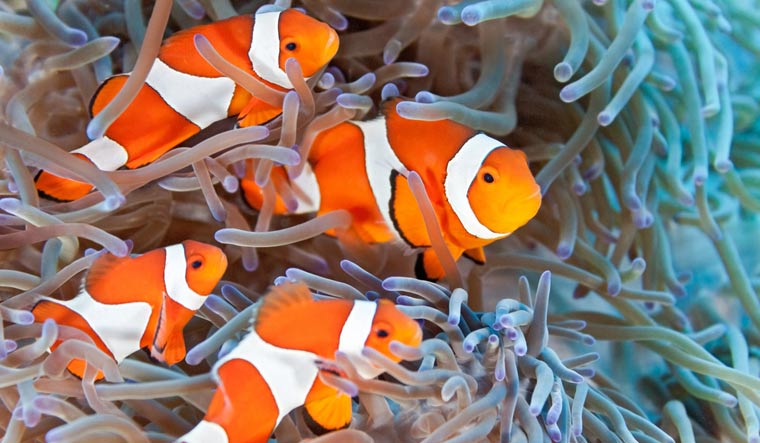Artificial light in coral reefs leaves the famous clownfish, made popular by the movie 'Finding Nemo', unable to reproduce offspring, according to a study unveiled Wednesday.
The study, published in the journal Biology Letters, shows an increasing amount of artificial light at night (ALAN) in coral reefs, even at relatively low levels, masks natural cues which trigger clownfish eggs to hatch after dusk.
Test eggs that were incubated in the presence of artificial light had a zero success rate of hatching, with no offspring surviving as a result, researchers said.
"The overwhelming finding is that artificial light pollution can have a devastating effect on reproductive success of coral reef fish," said Emily Fobert, Research Associate at Flinders University in Australia.
"When ALAN is present, no eggs hatched but when the light was removed during the recovery period, eggs from the ALAN exposure hatched like normal, so the presence of light is clearly interfering with an environmental cue that initiates hatching in clownfish," Fobert said.
"The results indicate increasing amounts of light have the potential to significantly reduce the reproductive fitness of reef fish who settle in a habitat near shore lines," she said.
Fobert monitored 10 breeding pairs of clownfish exposed to an overhead LED light which imitated commercially available and widely used lights near coral reefs.
Coastlines near reefs are exposed to artificial light at night by increasing numbers of housing developments, promenades, ports, harbours and dockyards -- which use LED lights that penetrate into seawater.
While tourists hotspots include floating accommodation above coral reefs, some of these fancy overwater bungalows even have glass floors with lights shining directly on the reefs below so guests can see the fish at night.
"These findings likely extend to other reef fish as many share similar reproductive behaviours, including the timing of hatching during early evening," said Fobert.
Clownfish are at risk because they spawn around the time of a full moon and their eggs usually hatch a few hours after dusk.
The presence of ALAN could compromise their natural reproductive cycle.
Senior author and founder of the Saving Nemo Conservation Fund, Professor Karen Burke da Silva, said improved understanding about the impact of ALAN on coral reefs can help develop solutions for stressed ecosystems.
"Artificial light at night is becoming a greater concern among ecologists, as light is spreading globally, and the impacts on organisms can be severe, but very little research has been done around ALAN in the marine environment," da Silva said.



